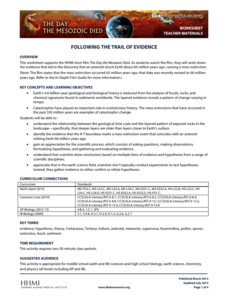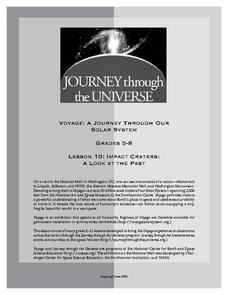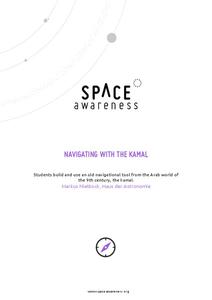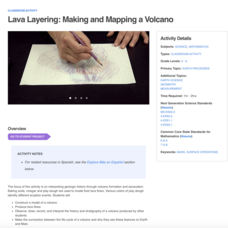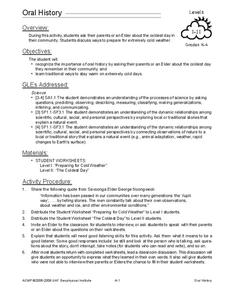Core Knowledge Foundation
The History of the Earth Tell It Again!™ Read-Aloud Anthology
A read-aloud anthology focuses on Earth's history. Over three weeks, young scholars listen to and discuss stories about the layers of the Earth, minerals, fossils, different kinds of rocks, and dinosaurs. After the lesson's text, each...
Columbus City Schools
The Mystery of Earth’s History
Every living creature can leave a fossil record, yet most fossils belong to extinct organisms rather than ones currently living. Scholars learn about dating rock layers, fossils, and the environment of the past. Pupils understand that...
Space Awareness
Navigation in the Ancient Mediterranean and Beyond
Ancient texts, like Homer's Odyssey, mentions navigating ships by observing constellations. Pupils learn about the link between history and astronomy as they relate to navigation in the Bronze Age. Scholars complete two hands-on...
Howard Hughes Medical Institute
Following the Trail of Evidence
One important skill in analyzing scientific evidence is identifying facts versus opinions. Scholars identify pieces of evidence from the film The Day the Mesozoic Died and then discuss this evidence in small groups at the end of each act...
It's About Time
The History and Scale of the Solar System
Take scientists beyond our earthly reach and into the solar system. Pupils create a model of the solar system and discuss strengths and weaknesses of their model. They calculate distances in light years, discuss the nebular theory, and...
Journey Through the Universe
Impact Craters: A Look at the Past
The Galle crater on Mars is also known as the Happy Face crater because of its appearance. First, scholars use pebbles and flour to simulate craters and study their properties. They then apply this knowledge to help decipher the history...
University of Colorado
Astro-Chronology
Class members play a version of the game Chronology to determine when certain scientific events occurred in history. Teams play until someone has 5-10 events in the correct order.
Starry Night Education
The Year and Seasons
Turn your classroom into a live demonstration of how the earth and sun interact to create the four seasons. Using a globe, a light source, and a series of constellation cards, super scientists discover how the motion of these...
Brooklyn Children’s Museum
Volcanoes!
Give young geologists an up close and personal look at volcanoes with a series of hands-on earth science lessons. Whether they are investigating the properties of igneous rocks, building their own volcanoes, or making fudge to model the...
Space Awareness
The Sun Compass of the Vikings
Evidence shows the Vikings likely navigated by using a simple sundial to find their course. Videos, a short story, and discussion help bring this time period to life as they study European history with a hands-on experiment. Scholars...
Space Awareness
Navigating with the Kamal
Historians have proven that as early as 1497 skilled navigators were using a kamal to sail across oceans. Scholars learn about navigation tools and astronomy before building their own kamals. They then learn how to use it to determine...
Curated OER
Volcanoes: Second Grade Lesson Plans and Activities
Young geologists explore volcanoes with a series of engaging geology activities. First, they learn the difference between magma and lava before coloring and labeling the parts of a volcano. During the lab, individuals watch a...
Howard Hughes Medical Institute
The Day the Mesozoic Died
While this is not the traditional, step-by-step lesson plan, it is chock-full of material that you can easily incorporate into your earth history unit. Its main purpose is to serve as a guide to using a three-part film, The Day the...
NASA
Lava Layering: Making and Mapping a Volcano
Looking for an out-of-this-world volcanic activity? Geologists study Earth's volcanic history and the neighboring planet Mars by modeling volcanic eruptions, lava flows, and building a shield volcano. Participants use graph paper and...
Curated OER
Time and Earth History Socratic Questions
Young scholars develop a sense of geologic ("deep") time and the ways in which Earth scientists construct the geologic time scale. They study he major events that shaped Earth, including the origin and evolution of its lithosphere,...
Curated OER
Oral History
Young scholars interview a Native Elder to learn about oral history and cold weather. In this weather lesson, students ask an Elder about the coldest day they remember in their community and complete two worksheets for the topic.
Space Awareness
Britannia Rule the Waves
Could you determine longitude based on measuring time? Early explorers used a longitude clock to do just that. Scholars learn about early exploration and the importance of the invention of the clock. Then pupils build their own longitude...
Messenger Education
Exploring Exploring
The reason people first began trading was because of their desires for objects other societies possessed. In the activity, classes discuss why exploration has been a common thread in all societies and where these desires have taken...
Brooklyn Children’s Museum
Rocks and Minerals in Our Lives
Young geologists discover the important role that rocks and minerals play in our everyday lives through this series of hands-on activities. Starting off with a lesson that defines the difference between plants, animals, and minerals,...
Messenger Education
Give Me a Boost—How Gravity Assists Aid Space Exploration
The propellant needed for space explorations runs in the thousands, while paying to get the craft into orbit costs millions! In the second installment of three, two activities explore laws of conservation of energy and momentum. Using...
Curated OER
Earth and Beyond!
Students investigate one or more of the following topics and develop a plan for the future regarding it: global warming, lunar exploration, space travel, Mars exploration, or terraforming. They disucss the audio files and the video that...
Curated OER
Fossil Fuels (Part II), The Geology of Oil: Topographic Mapping, Crustal Deformation, Rock Porosity, and Environmental Pollution
Young scholars review an interpretation of geologic history and relate it to the formation of oil deposits. They explore and explain factors controlling the porosity and permeability of sediments and sedimentary rocks. Pupils also...
Global Oneness Project
Protecting Wilderness
Would you live in a tree for three years to protect a redwood forest? Viewers of Rainhouse Cinema's Among Giants documentary consider the actions of Earth First! environmental activists who moved into the treetops of a grove of giant...
Newspaper Association of America
Cereal Bowl Science and Other Investigations with the Newspaper
What do cereal, fog, and space shuttles have to do with newspapers? A collection of science investigations encourage critical thinking using connections to the various parts of the newspaper. Activities range from building origami seed...





